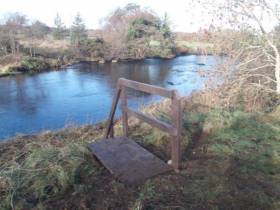Displaying items by tag: River Easkey
New Project To Improve Angling Access On River Easkey
#Angling - A new project on the River Easkey in Co Sligo which has improved and developed angling access to the wild salmon river between Sligo and Ballina has now been completed.
The project, which was delivered by River Easkey Angling Association, received support from Inland Fisheries Ireland (IFI) via the National Strategy for Angling Development.
Structures such as footbridges, stiles, and ladders were installed along the river, which is located on the Wild Atlantic Way, while walkway routes on the banks of the salmon and trout fishery were also improved.
The work took place upstream of the famous Workhouse Bridge as part of the second phase of this project which initially involved similar works downstream of the bridge last year.
In total, the project has delivered eight new access points to angling, 13 footbridges ranging from three to four metres in length, and five kilometres of improved trail access.
Sean Canney, Minister of State for responsibility for inland fisheries, said on Wednesday (23 January): “I welcome the continuing efforts of Inland Fisheries Ireland in delivering under the National Strategy for Angling Development in partnership and collaboration with local angling clubs and community groups nationwide.
“Inland Fisheries Ireland committed €23,500 in total to support the Easkey project with €10,000 awarded in 2017 and a further €13,500 granted in 2018.
“I also want to congratulate the River Easkey Angling Association on its excellent development ethos. They are a progressive group that helpfully operates an open policy for holders of a State Salmon License with season and day tickets available for access,” he added.
Suzanne Campion, head of business development at IFI, said: “The River Easkey Angling Association has done fantastic work in developing this area as an angling destination. While completing this project and working closely with our project officers, they have given due diligence to everything from financial and environmental governance to biosecurity considerations ensuring the conservation and protection of this wonderful resource.”
Alan Spencer, assistant secretary of the River Easkey Angling Association, expressed the club’s thanks to Inland Fisheries Ireland’s staff for all their help and support during the project, as well as gratitude to landowners who permitted the club and its contractor access to the river through their property.





























































